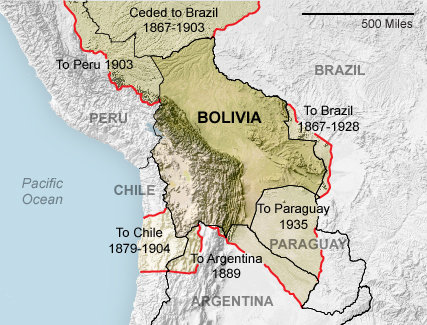On September 24, 2015, the International Court of Justice, or ICJ, overruled Chile’s preliminary objection to the court’s jurisdiction to hear a case filed by Bolivia against them two years prior, known as the Obligation to Negotiate Access to the Pacific Ocean (Bolivia v. Chile). As the title of the case suggests, Bolivia is requesting that the ICJ declare that Chile has an obligation to negotiate an agreement that would allow Bolivia access to the sea. Bolivia, as a landlocked country, has sought out a sea port since they lost all of their coastal territory to Chile in 1884 after the War of the Pacific. To this very day, the ceded territory has been a source of bitter controversy between the two countries, and has yielded myriad unsuccessful requests for the two countries to come to a compromise on the issue. That has been the case until April 24, 2013, when the president of Bolivia Evo Morales took the issue to litigation in the ICJ. Chile has generally been unwilling to allow any sort of Bolivian corridor to the Pacific, and while that may not seem very fair, Chile’s obstinacy has more merit than one would ostensibly observe.
The War of the Pacific was a war founded on complex strings of business assets, alliances, and economic crises that would require a college thesis to explain fully. But in summary, Chile had occupied Antofagasta, a town within Bolivian territory at the time, in an effort to protect a large and powerful Chilean company’s business assets from the Bolivian government’s decision to confiscate them. This occupation was seen as an act of war by the Bolivian government, and despite a cursory attempt to find a diplomatic solution, Bolivia invoked a secret treaty between Peru and themselves. Together they declared war on Chile for the occupation.
Dragged into the conflict, Chile had been extremely successful in the war, and by 1883, was able to defeat both countries and force an armistice. Chile signed two separate peace treaties with Peru and Bolivia, the Treaty of Ancón and the Treaty of Valparaiso, respectively. The Treaty of Valparaiso, with the proceeding Treaty of Friendship in 1904 to make the arrangement permanent, relinquished all of Bolivia’s coastal territory to Chile; and in exchange, Chile promised to construct a railway between the capital of Bolivia, La Paz, and Arica, a coastal town now within the confines of Chilean territory. Chile also promised to allow all Bolivian commerce to move freely between the two towns. Essentially, Chile would be guaranteed a corridor to the sea that would be unobstructed by Chilean duties or regulation. To this day, the contested land has been known as the Atacama corridor.
Chile has made good on its promise to allow unrestricted access to the sea for Bolivian commerce, but Bolivia has increasingly sought sovereign control of the Atacama corridor instead. Chile does not feel it has any obligation to grant Bolivia accommodations beyond what was agreed in the 1904 Treaty of Friendship, while Bolivia claims that the Chilean government has made diplomatic promises to them in the 1950’s and 1970’s regarding a sovereign route for Bolivia, and seeks to essentially bind them to fulfilling that promise through the ICJ. This is where the case is today. The ICJ has held that it does have jurisdiction to hear the dispute, despite Chile’s proposition that the Court lacked jurisdiction due to Article VI of the Bogota Pact preventing the ICJ from deciding matters, “settled by arrangement between the parties, or by arbitral award or by decision of an international court” or “governed by agreements or treaties in force on the date of the conclusion of the [Pact of Bogotá].” The ICJ did not feel the Treaty of Friendship settled this particular matter, and believed it said nothing of a potential agreement to grant Bolivia sovereign control over that corridor. Therefore, the Court felt that jurisdiction was proper and continued with the case.
What the ICJ will decide on the matter is difficult to ascertain. Many experts believe that Bolivia is fighting a losing battle, while others believe that Bolivia’s sovereign right to the sea is overdue for recognition. The ICJ has never recognized a “right of expectation” that Bolivia is putting forward, and may not even be likely to do so now. Regardless of the outcome, this case literally could wind up changing our maps as we know them, and it will be fascinating to observe as the case moves forward.


